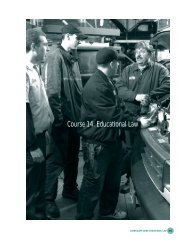Facilitating
Teaching and Facilitating Learning - Level 2 - Washington State ...
Teaching and Facilitating Learning - Level 2 - Washington State ...
- No tags were found...
Create successful ePaper yourself
Turn your PDF publications into a flip-book with our unique Google optimized e-Paper software.
EFFECTIVE TEACHING, FACILITATING AND LEARNING II (CONT.)Essential Content Discussion Topics and Key PointsWhat is effective teaching for the • Focuses on student learning rather than content.experienced instructor? (cont.) • Designs effective assignments and ties them to effective assessmentsof student learningProcessing information • Analytical approach: step-by-step processing, logical inductiveprocesses, objective• Global approach: right brain/left brain, field sensitive, deductive orintuitive processes, subjective• Adult memory and storage: short term working memory (chunking)and long-term learning (imagery, encoding verbal, retrieving via freeor cued recall, etc.)Designing assignments • Opportunities for students to practice the skills• Involve students in formulating the assignment• Explain how work will be assessed• Defined the scope and time required to complete the assignment withreasonable effort• See What’s an Effective Assignment? attached.Lessons incorporating the • The Preparation phase of the learning cycle is four part: preparingUniversal Learning Cyclethe teacher to teach, preparing students to learn, preparing thelearning environment and preparing materials.• The Presentation stage is the introduction of new material, oftenoverindulged. Teachers learn how students both receive and processinformation and why it is important to reduce Presentation time andlengthen the more active learning phases of Practice andPerformance.• Facilitators will learn how to use both Practice and Performance tosolidify learning for long-term memory, and create successfullearning experiences.• In addition to facilitating learning, the Performance element of thelearning cycle provides teachers the opportunity to observe andevaluate learning.The Constructivist classroom • Students construct meaning from their learning activities.• Social constructivism views of knowledge and learning - Vygotsky:the world is complex, culturally negotiated, and values sociallyconstructed.• Knowledge and understanding are constructed through social talkand problem solving and shared tasks. (Driver et all 1994, p. 7)• 5 principles (See Constructivism attached.)Conduct of the experienced instructor • Knows when and how to be responsive and helpful to students.• Demonstrates professionalism at all times:• Actively seeks out student input and questions.• Persistently and naturally assesses student learning and his/her owninstructional effectiveness.How the brain learns • Experienced teachers help students understand how they learn andhow their brain works• Building dendrites and making synapses i.e. making connections,remembering =learning• See Incorrect and Counterproductive Assumptions About Learning,attached.• Refer to Rita Smilkstein’s articles—Transferring Complex Knowledgeand How the Brain Learns: Research, Theory and MathematicsClassroom Application in the Resources (Section #18) of this guide.2.6CURRICULUM GUIDE: TEACHING & FACILITATING LEARNING - LEVEL 1I




